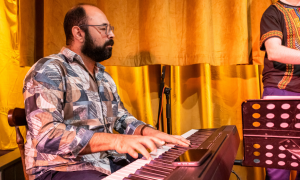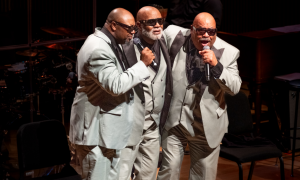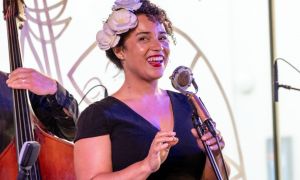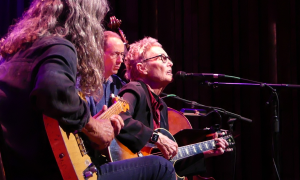Home » Jazz Articles » Live Review » Burghausen Jazz Festival 2013
Burghausen Jazz Festival 2013

Burghausen, Germany
March 12-17, 2013
Located almost exactly halfway along the border of the province of Bavaria (located in Germany's southeast) and Austria, the town of Burghausen might seem an odd place for a jazz festival, especially one now celebrating its 44th year. But this town of just 18,000 people, located literally a stone's throw (or a quick bridge walk) away from Austria, has long been a wealthy town, thanks to the Wacker chemical company. But just as is true with oil-rich Norway, having money in no way ensures that it will be used to support the arts; thankfully, Burghausen isn't just a town rich in material goods; it's also a town with a cultural heart.
You only need walk down the town's "Street of Fame," where bronze placards embedded in the cobblestones reflect Burghausen's longstanding commitment to jazz, with inductees past and present including trumpeter

Dizzy Gillespie
trumpet1917 - 1993

Teddy Wilson
piano1912 - 1986

Chick Corea
piano1941 - 2021

Cassandra Wilson
vocalsb.1955
What is, perhaps, surprising is that the Burghausen Jazz Festival (or, as most called it, B-Jazz) actually brings in more of its audience from outside the town than it does its locals. According to Andreas Bentlage, who handles public relations, marketing and artist liaison, "Last year we did a survey, and the result was that most of our audience comes from other towns; we had people from England, Switzerland and France; although most do come from Germany or German-speaking countries."

This year's program is heavily dominated by American artists—in addition to Wilson, artists included guitarist

John Scofield
guitarb.1951

Gregory Porter
vocalsb.1971

Jon Faddis
trumpetb.1953

Nathan Davis
saxophone1937 - 2018

Benny Golson
saxophone, tenor1929 - 2024

George Cables
pianob.1944

Abraham Laboriel
bass, electricb.1947
Still, the idea of a town of 18,000 supporting a jazz festival when most towns that size in North America are lucky to have a movie theater speaks to the town's distinct nature. "B-Jazz was founded at a time when there were fewer cultural venues," says Bentlage. "Burghausen is a rich city, with a large chemical industry that pays a lot of taxes, and so the city supports what we do here, by providing funding, and correlating with that industry, we have many people here with academic backgrounds and higher level educations, so the result is a greater interest in jazz.
"It's a festival of continuity," Bentlage continues. "There's been no break in its 44 years. It was founded almost randomly; there was a jazz movie being shown in the old part of town, and two men thought, 'OK, let's do something with jazz in this city,' and it has grown from a shorter festival in a small venue to a week-long event in Wackerhalle [which seats 1,276 people]. The city contributes the most money, but it's not enough; half of our costs are covered by ticket sales, and the rest comes from the city and some private sponsorship, like the local bank. We also have a lot of things given by Wacker— like the venue [Wackerhalle], electricity, heating, firemen, parking spaces...we don't have to pay for any of this, so we also get a lot of soft dollar support."
Beyond providing a great program to its attendees—this year also including pianist

Aki Takase
pianob.1948

Klaus Doldinger
b.1936"The competition is in its fifth year," says Bentlage. "The groups apply with an anonymous CD, meaning we get it in the office and assign it a number, so that the jury receives the music without knowing who it is. Applicants cannot be older than thirty and there must be at least three members in the group, so no solo artists or duos. People can apply from anywhere; we get applications from as far away as the USA and New Zealand—today, the jazz scene is so multinational, and young people are networking increasingly around the world. The bands are given travel support and a certain amount of money for accommodations; they can choose how to get here, whether it's by train, plane or car.
"We get somewhere between 50 and 100 applicants," Bentlage continues. "The winner gets 5,000 euros in cash and an additional 10,000 euros, to be used for creative development—touring, making a CD, promotion, equipment, whatever, as long as it is used for creative development. the money comes from the city of Burghausen. We enjoy doing it because we may be small, but we're hungry for the whole world to come here."
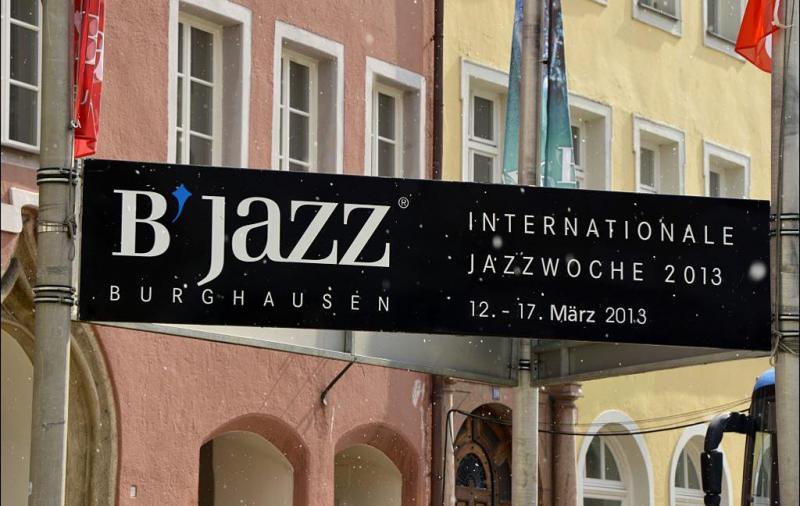
This year's winner, Mat©®ss ?udars Quartet, not only turned out to be a great choice that wowed the audience who'd come to hear Wilson—no mean feat, given the Latvian guitarist was absolutely nothing like Wilson's eminently accessible jazz and blues- drenched music—but it was also remarkable in that it was a unanimous choice from the panel of judges, and a decision made literally in seconds after the five groups performed—all excellent bands, according to Bentlage, but clearly ?udars had something special that was clear from the first moments of his performance.
The festival is also connected to a jazz school in the town, and during the week of B- Jazz the members of the Jazz Master All Stars, organized by trumpeter Claus Reichstaller, delivers a series of master classes to the academy's young attendees, with one lucky participant winning a chance, this year, to perform a onstage with the All Stars when the septet opened the Scofield double bill. "For more than 35 years, we've had a kind of jazz school here," says Bentlage, "and we thought it would be good to have an academic complement, so we asked Claus [Reichstaller]—he's the head of the Jazz Institute in the Munich University. We decided to found the jazz academy last year, here in Burghausen. We have three classes per year: a winter academy; the master class during our jazz week; and a summer academy that's open to other kinds of music as well as jazz."
Burghausen is a beautiful town, and home to the oldest—and, at over a kilometer in length, the largest—castle in Germany, situated on a hill overseeing the old part of town and dating back to the 13th or 14th century. In the evening, with the castle lit up, it's a truly stunning site. And with cobblestone pathways throughout the old town, restaurants serving up local cuisine, and a friendly atmosphere that makes it an inviting and enjoyable place in which to be, it's no surprise that attendance is strong and that it draws people from farther afield.
"I want to invite all the people in the world to visit Burghausen," concludes Bentlage. "It's a beautiful city, we have a great atmosphere and it's a great place to visit. We love what we do, and I think the fans and the musicians feel this. We try to do the best we can for the musicians, so that they can just concentrate on giving the best show they can. If we can do this, then we know the audience will enjoy it."
Chapter Index
March 13: Mat©®ss ?udars Quartet / Cassandra Wilson
March 14: Jazz Masters All Stars / John Scofield Organic Trio
March 15: Larry Graham and Graham Central Station
March 16: Klaus Doldinger's Passport / Gregory Porter
March 17: Next Generation Day / Festival Wrap-Up
March 13: Mat©®ss ?udars Quartet / Cassandra Wilson
It was hard to know who was having more fun being at Wackerhalle on the first official night of B-Jazz—the packed house there to hear singer Cassandra Wilson, or Mat©®ss ?udars. When the Latvian guitarist took to the stage with the members of his quartet— alto saxophonist Toms Rudzinskis, double bassist Lennart Heyndels and drummer Niels Engel—the huge round of applause clearly took him aback, but if the group was nervous performing in front of such a large audience, it didn't show one bit.
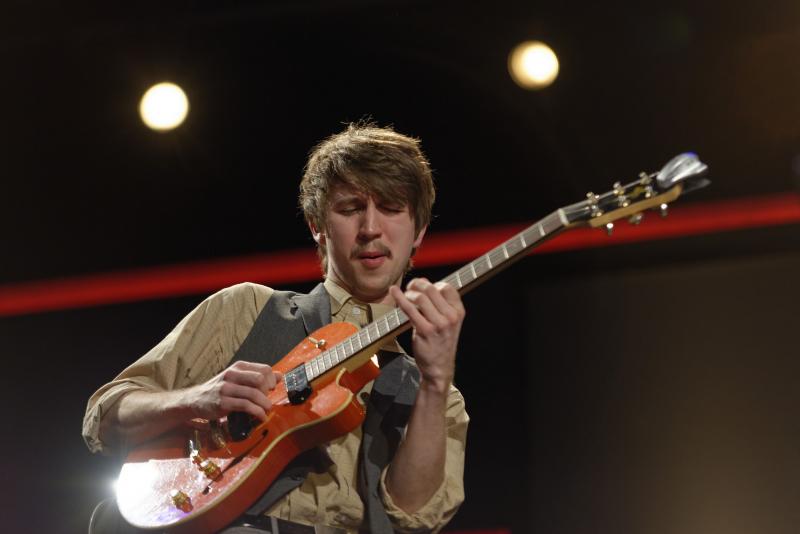
Performing music from the group's recently released debut, Melancholia (Self Produced, 2012), ?udars, in particular, proved himself someone worth watching. Thoroughly engaged and engaging, the guitarist's masterful command of his instrument belied his youthful age (22), playing with the kind of maturity and tasteful restraint rare in someone so young, though he was absolutely capable of cutting loose when the music demanded. Clearly ambitious, the guitarist has already spent time at the renowned Workshop in Jazz and Creative Music at The Banff Centre in beautiful Banff, Canada, situated in the eastern end of the Rocky Mountains—the annual three-week workshop whose artistic director is trumpeter

Dave Douglas
trumpetb.1963
Heyndels and Engel formed a particularly formidable rhythm team, capable of handling the demands of ?udars' writing—while richly melodic, often knottily constructed, with unexpected stops and starts, metric shifts and demanding dynamics. Both also proved themselves to be strong soloists, in particular Heyndels, whose occasional opportunities demonstrated firm yet pliant touch and tone, and an ability to navigate ?udars' changes with confidence and ease.
If there was a weak link in the group—and it was a relatively small one—it was Rudzinskis, though it was more about tone than what he was actually playing; as capable as his band mates, his sound was a tad on the thin side, and with so much robust music happening all around him, it sometimes got swallowed up. But if he can address his tone, Rudzinskis may well be someone as worthwhile to watch as the rest of the group.
While it was clearly a collective when it came to playing, this was clearly ?udars' group, both musically and visually. With a youthful enthusiasm that was never excessive, ?udars was the kind of player who commanded attention onstage; clearly having the time of his life in front of such a large audience, he made the absolute most of it, and while he seemed, at times, to be somewhat awed by the experience, when it came time to introduce the music and the band, he was confident and direct with the audience. A modernist writer whose music possesses hints of everything from guitarist

Kurt Rosenwinkel
guitarb.1970

Brian Blade
drumsb.1970

James Farm
band / ensemble / orchestrab.2009
The last time encountering Cassandra Wilson, it was a less-than-satisfying experience. Her 2009 performance at the Enjoy Jazz Festival in Ludwigshafen, Germany, suggested that her days as a groundbreaking artist were behind her, as she seemed to be resting more on her laurels than giving it out to her audience.
The good news is that with her B-Jazz appearance, that Ludwigshafen show may have been an anomaly...or, perhaps, that she needs to be more astute in her choice of band members. The group in Ludwigshafen was marred by an unnecessarily busy percussionist and a guitarist who took excessively long solos, perhaps because Wilson seemed more interested in floating around the stage than singing. All that changed in Burghausen. A tight quartet led by musical director and guitarist

Brandon Ross
guitar
Lonnie Plaxico
bassb.1960
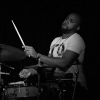
John Davis
drumsIt didn't start out to be a very good day for Wilson; arriving later than planned the evening before, her luggage didn't make it to Burghausen until an hour before showtime, forcing festival staff to help her find suitable clothing in town (which she did). Still, there were no signs of stress or upset when, first the band, and then the singer took to the stage, performing music from Wilson's latest album, Another Country (EOne, 2012), but dipping farther back into her catalog to touch on songs from Silver Pony (Blue Note, 2010) and one of her breakthrough recordings, New Moon Daughter (Blue Note, 1995), from which she delivered a significantly rearranged version of "Harvest Moon," after giving the audience the opportunity to choose either singer/songwriter Neil Young's tune or, from Belly of the Sun (Blue Note, 2002), the Jimmy Webb classic "Witchita Lineman."
What made Wilson's performance so much better than her Ludwigshafen show was that the singer seemed completely engaged with her band; and Burnham provided more than a few set-defining frisson moments on violin, using a wah wah pedal to great effect to give it a near-vocal timbre. With a warmer tone than usual for the instrument, he was the perfect complement to Ross, who alternated between a nylon-string guitar and steel-string frame guitar, as capable at finger-style picking of Another Country's title track as he was a more visceral, blues-centric approach on the rootsy "Saddle Up My Pony." Wilson played a little guitar too, appropriately using a red Fender Stratocaster for minor-keyed blues, "Red Guitar," though she said, at the end of the song, that it was a borrowed guitar: "It's a nice guitar, but I play a Telecaster,' she joked.

Even in Ludwigshafen, the quality of Wilson's voice was never an issue; it's just that her performance felt more like a "show" than a group of players getting together for a set of music that ranged from the Mississippi Delta to the Caribbean. Here, her rich-toned voice was as good as it's ever been, and her interpretive skills equally strong. Wilson's aversion to over-singing has always been a strength; when she does deliver the occasional bit of near-scat, it's all the stronger because it's not a huge part of her delivery.
Wilson engaged with the audience on a very personal level as well, saying how particularly nice it was to be back in Bavaria, as her first record label (JMT) was from the provincial capital, Munich. When she returned for a well-deserved encore, she'd made a comment, earlier in the set, about having to leave early the next morning, but that she needed to find a good German beer, so when one of the stage staff came out with the obligatory bouquet of flowers, another joined him with a glass of beer. Wilson took a deep sip, raised her eyes to the sky and was clearly happy. As, it was equally clear, was her audience.
March 14: Jazz Masters All Stars / John Scofield Organic Trio
With the master class still taking place at Burghausen's music school, the invited faculty for those classes gave their own master class in mainstream jazz to another packed house at Wackerhalle on Thursday, March 14.
Coming out of the gate swinging, courtesy of bassist Abraham Laboriel—a man in constant motion and having lost none of his youthful energy, despite having put on a few pounds and a lot of gray hairs over the years—and drummer

Dennis Mackrel
drumsb.1962

But Faddis wasn't all just about range; during a Latin-esque look at Clare Fischer's "Morning," he delivered a solo of near-vocal quality, an approach he used later in the set when, in an a cappella moment, he began to truly articulate like a voice with one hand on the trumpet, the other making motions that matched what he was saying through his instrument. Plenty of musicians talk about letting the music speak for themselves, but Faddis brought a whole new meaning to the idea.
With Benny Golson's soft tenor tone beautifully complemented by Nathan Davis' harder- edged tenor and soaring soprano, the two-trumpet, two-sax lineup was supported perfectly by pianist George Cables, who got plenty of solo opportunities as well. A highlight of the set came when Golson—looking like a man of 50 rather than 84—took the mike, saying, "I've a friend from New York who sends his greetings. He's a bit strange, though; his name is 'Killer Joe,'" from which the band kicked off an ambling version of one of Golson's most well-known compositions. When Golson wasn't playing, he was either cradling his horn or standing there with a big smile—always a big smile—on his face, snapping his fingers and just digging on what was going on around him. There are those who say music keeps you young, and with Mackrel the baby of the band at 51 and the rest of the band in their sixties or beyond, the Jazz Master All Stars sure made a case for it.
Laboriel was a constant stream of visual energy; always a particularly muscular player on electric bass, but more about touch than volume, his solos invariably built to fever pitch, at times engaging the audience, at other times driving Mackrel to follow his rhythmic stops and starts.
Overall, it was a set heavy on swing and straight-ahead balladry, the kind of amicable cutting contest that, back in the day, helped aspiring jazz musicians cut their teeth and get their chops. Andreas Untereiner, a young trumpeter from the week's master class, was selected to sit in with the group on an incendiary closer, Dizzy Gillespie's "Manteca," and proved that, while it's not happening nearly enough, the art of mentoring is still happening in some places, and certainly in Burghausen, with B-Jazz and its now two year-old Jazz Master classes.
Guitarist John Scofield, like so many other musicians of his generation, has often got so many projects going on that there are some which never get documented. With his next album a reunion of the ?berjam band responsible for ?berjam (Verve, 2002) and Up All Night (Verve, 2003), it looks like his Organic Trio, with organist

Larry Goldings
organ, Hammond B3b.1968

Gregory Hutchinson
drumsb.1970
Opening with a fast, swinging blues by saxophonist

Joe Henderson
saxophone1937 - 2001

Eddie Harris
saxophone, tenor1934 - 1996

Vince Mendoza
composer / conductorb.1961
But the one thing upon which can always be counted is Scofield; he may shift gears regularly, but his singular voice is unmistakable, regardless of context, whether or not he employs a series of guitar effects boxes...or even if he changes guitars, as he has for this tour. When he last played at the TD Ottawa International Jazz Festival with the Piety Street Band, he surprised a lot of guitarists by playing a white Fender Stratocaster almost as often as his trusty old Ibanez hollowbody electric. Here, in Burghausen, it was another white guitar, but this time a Fender Telecaster, and if this show was anything to go by, he should stick with it. Running through an equally trusty Vox AC-30 amplifier (in this case, actually his own amplifier, one he keeps in Europe, and a real rarity at a time when travel costs force most guitarists to play through amps provided by the event—hopefully the make and model they want, but oftentimes not), the added twang and grit, especially in the low end of the instrument, really suited Scofield's approach, whether he adopted a warmer, cleaner tone or dirtier, more overdriven sound.

The seven-song set ranged from choice covers, like

Ray Charles
piano and vocals1930 - 2004

Jack DeJohnette
drumsb.1942

Tony Williams
drums1945 - 1997
Hutchinson was the ideal rhythmic foil, as comfortable with a lazy, behind-the-beat backbeat as he was swinging hard or playing with delicate elegance on a balladic encore of Patty Page's hit, "The Tennessee Waltz." Ears open, he made this trio unequivocally an equilateral triangle where directional shifts could come from anyone, even though Scofield was the clear leader.
A main set-closing piece of funk gave Scofield the opportunity to push his blues-laden playing into

Jimi Hendrix
guitar, electric1942 - 1970
March 15: Larry Graham and Graham Central Station
After a powerful and loud opening set from Big Sam's Funky Nation, the Wackerhalle stage was reset, with steps leading up to it, for Larry Graham and Graham Central Station. Graham was the bassist in Sly & The Family Stone in its heyday of groundbreaking appearances at Woodstock and albums like Stand! (Epic, 1969) and Dance to the Music (Epic, 1968), and considered the inventor of the funky slapping and popping technique he calls "thumping and plucking." Leaving Sly in the early '70s, he began his own group, Graham Central Station, which has managed to survive, albeit with considerable personnel changes, ever since.
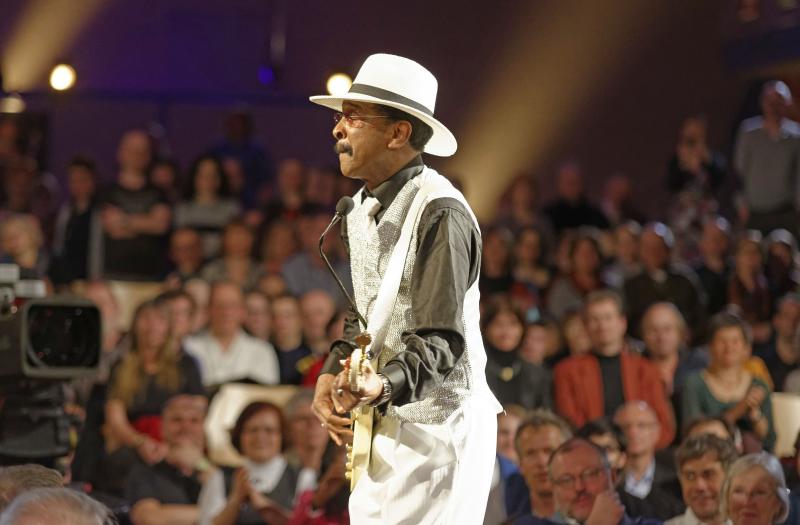
Graham is promoting a new record, Raise Up (Moosicus, 2012), but surprisingly, he played very little from the album at his B-Jazz performance...not that anyone seemed to care, as the band hit the stage, with his female singer Ashling Cole (nicknamed "Biscuit") riling the audience up for Graham, who came through to the stage from the rear of the house, thumping and plucking all the while. Hitting the stage with a sextet that included, along with Cole, two keyboardists (David Council and James McKinney), guitarist Wilton Rabb and drummer Brian Braziel, Graham—turning 67 later this year—revealed absolutely no signs of slowing as he kept the energy up throughout the entire set at the pace of a twenty year-old, moving around the stage with choreographed moves and plenty of just plain burning energy.
If there was any complaint to be had, it was that, aside from Graham, whose deep baritone remains intact, the rest of the band members were good but merely average singers. Cole, in particular, had a rather shrill voice, and while the entire show, like Big Sam's, was loud, when she got a solo spot singing the Ann Peebles staple made famous by Tina Turner, "I Can't Stand the Rain," she may have hit every note, but it was the quality of her voice that, sadly, didn't really cut it—or, perhaps more accurately, cut through too much. And her schtick—moving around the stage, pointing at various members of the band and mugging for the crowd—ultimately became tiresome, while her dance moves felt stiff and unnatural, especially compared to Graham.
There was, perhaps, too much preponderance on groove and less on song—in particular it would have been great to hear Graham's kick-ass take on

Stevie Wonder
vocalsb.1950
Instrumentally, the group did what it needed to do: some searing solos from Rabb, McKinney and Council, rare but powerful spots from Braziel, who managed to keep the relentless pace throughout the set without ever lagging. But it was Graham's show, and along with one costume change (and, when removing the white coat of his first suit, revealing a sequin-studded vest), a bundle of energy and a way to engage the audience (at one point, even inviting some young musicians from the crowd to come up and play with the band—one organist, one guitarist and one bassist being especially good), it may not be a show that would stand up to repeat listens, but at the end of the day it was just plain fun...and, perhaps, that's all it was really meant to be.
March 16: Klaus Doldinger's Passport / Gregory Porter
While the festival promotes its Saturday night as the mainstream night, that's not exactly how the first act would be described. Since forming the group in the early 1970s, German saxophonist

Klaus Doldinger
b.1936Maybe it's because Passport's always been on the more accessible side of the fusion equation, strong on melody, groove and, on occasion, some harder-edged grit, that's allowed Doldinger the luxury of keeping it alive for more than 40 years. Of course there are none of the original personnel, save Doldinger himself, in Passport 2013, but the saxophonist has brought together a percussion-heavy septet—with percussionists Ernst Str?er and Biboukl Darouiche, drummer Christian Lettner, keyboardist Michael Horneck, bassist Patrick Scales and, originally from Australia, guitarist

Peter O'Mara
guitarb.1957

Scales, who also co-leads a band with his brother, guitarist Martin Scales, has been with Passport for nearly twenty years—something of a record, but one matched by O'Mara, who moved to Munich in 1981 and since becoming a fixture on the German jazz scene. Both were in fine form at B-Jazz: Scales, a bubbling groove-meister and, during his solo spot during "Bellydance," one with a surprisingly broad command of his instrument; O'Mara largely favoring a densely overdriven, whammy bar-centric but harmonically sophisticated approach that made him the most exciting soloist of the show, overall, demonstrating that he's more than just a fusion player during his solo on "Malesh," where he quoted, amongst other things, trumpeter

Dizzy Gillespie
trumpet1917 - 1993
As was Doldinger's saxophone playing. Not exactly a virtuoso, he played to his strengths and built solos predicated on melody and intensity of tone rather than furious displays of technical virtuosity. The music dipped back into Doldinger's 40 year-plus Passport repertoire, but also featured music from the group's most recent disc, Inner Blue (Warner Germany, 2011), in particular the hard-and-heavy "Mangroove." Throughout the set, Doldinger engaged the audience in a relaxed fashion, with plenty of stories and hopes to see Passport turn 50 in a little less than a decade. That he continues to work this band, which tours internationally, on a regular basis, is all the more remarkable for the nearly 77 year-old saxophonist, since his work for film and television has long since ensured a healthy income. Clearly Passport still means a lot to him and, judging from the audience's reaction, it means a lot to them too.
On the ascendancy the past couple years, first with his debut, Water (Mot©”ma, 2010) and now with the Grammy-nominated Be Good (Mot©”ma, 2012), singer Gregory Porter proved an interesting case of a singer who looks to be outgrowing his band. Using the same group that first came together at a small club in Brooklyn, New York, where the Los Angeles-born singer now lives, it's hard to deny the value of friendship and camaraderie in a group. Still, a singer is only as good as the band backing him/her up, and in Porter's case, he has grown so rapidly over the last couple years—touring over 200 dates per year and traveling around the globe—that while his performance at B-Jazz was nothing short of exceptional for his contribution, it was difficult not to imagine how he'd have sounded, had he a group at the same level.
Not that any of his group were particularly bad—though saxophonist Yosuke Sato could learn a thing or three about the use of space, as every solo was a constant flurry of notes and unrelenting motion across his alto's register, something not helped when Jon Faddis joined the group for a few songs and turned then into a friendly cutting contest that drove Sato to even busier (and more shrill) heights. The group was tight, no doubt about it, hitting all the marks, and supporting Porter capably and with feeling. But there was the sense, especially in songs like Porter's incendiary "1960 What?"—about the early 1960s Detroit city fires that the singer delivered with the kind of commitment that almost felt as though he'd been there—where it became clear that no matter how terrific Porter was (and he was terrific), he'd have been even more so with a band capable of a little more finesse, and a little more subtlety; sometimes its approach was just too obvious.

Irrespective of the band's shortcomings, Porter really is the new male voice in jazz, his rich, dark baritone as capable of

Jon Hendricks
vocals1921 - 2017

Nat Adderley
trumpet1931 - 2000
Faddis was a masterful guest onstage, though even with him there were times where a little more restraint would have helped. Still, his technique is impeccable, his facility and reach one that few can parallel today. But the show truly belonged to Porter—who, after the show, was awarded the Impala Prize by Membran Media's G?tz B©╣hler, for sales of over 40,000 units in Europe. Clearly Porter's star is on a major ascendancy, and staying on the road is translating into sales rare for even the most established jazz artists. But he's also on a cusp of even greater things, and as hard as it may be for him to first acknowledge and then act upon, his own talent has simply eclipsed that of his band. Porter has already demonstrated the capacity to become one of jazz's truly great singers; now, for the next step, he needs a band capable of putting him there.
March 17: Next Generation Day / Festival Wrap- Up
The final day of B-Jazz is devoted to a series that, now celebrating its 10th anniversary, provides an opportunity for four up-and-coming bands to play at either the 600-seat Stadtsaal or in the club atmosphere of the Jazzkeller, where pianist

Kirk Lightsey
pianob.1937
But more than merely an opportunity to perform live, Next Generation is also a collaboration between Germany's Jazzthing magazine and Double Moon record label, with five groups selected each year to record and release a CD. The only prerequisites are that the group must be relatively young (thirty or under), and must not have released an album previously. Four groups are chosen to perform at B-Jazz; three at a late afternoon concert at Stadtsaal—this year, the east-meets-west trio Ek Safar, vibraphonist Sonja Huber's Quartet and singer Nils-Christopher V?gler, going under just the name Nils-Christopher—and, closing out the festival with a 9:00pm performance at the Jazzkellar, the Offshore quintet.

While time did not allow catching all four acts, the first two of the day were certainly promising. Ek Safar brings together German pianist Nicolas Schulze and clarinetist Heiner Stilz with Indian tablaist Soumitra Paul. The result—a combination of individual compositions by each of the band members, some collaborative writing and a couple of traditional Indian ragas rearranged by the group—couldn't help but bear some resemblance, texturally, to early-to-mid-period

Oregon
band / ensemble / orchestra
Ralph Towner
guitarb.1940

Paul McCandless
woodwindsb.1947

Glen Moore
bass, acousticb.1941
Collin Walcott
percussionb.1945

Trilok Gurtu
tablasb.1951
It was a relatively quiet and tranquil set that had the occasional climactic moment, but was a nice and easy way to slip into the afternoon's schedule and lead to a more upbeat set from Swiss vibraphonist Sonja Huber's Quartet.
Huber's group has already changed considerably from the quartet that recorded its debut, William's Garden (Double Moon, 2012), in Switzerland in May, 2011. Gone were bassist Martin Wyss and drummer Daniel Bolli, replaced by Patrick Sommer and Valeria Zangger, respectively, for a set that took considerable inspiration from vibraphonist

Gary Burton
vibraphoneb.1943

Pat Metheny
guitarb.1954

That said, there's plenty of promise. Huber's use of violin bows on the vibes created wonderful resonant textures, in particular on the opening "De Chilini Prinz," and her four-mallet technique, while clearly still a work-in-progress, was impressive enough. Guitarist Matthias Siegrist, the only holdover from the recording, was also impressive as a rare guitarist of his generation not to sound like he was coming directly from the

Kurt Rosenwinkel
guitarb.1970
A noon-hour press conference earlier the same day, revealed the successes and challenges of running a world-class jazz festival in such a small town.
The good news is that the B-Jazz 2013, with more than 7,000 paying guests and over 8,000 attendees total, has broken even—the festival's goal, as it's not looking to turn a profit. With a great many people coming to the festival from places other than Burghausen, it also meant more revenue pouring into the town (and the Austrian town on the other side of the river) for hotels, restaurants and shopping.
Still, as the town's mayor explained, funding is becoming increasingly difficult. The city needs to fund a great many things, including other forms of art and sports, and while a larger center like Munich has a lot of money to go around, even a rich town like Burghausen, with Wacker a major employer, is limited. Still, with B-Jazz's 50th Anniversary six years away, the mayor was very clear that, though there may be challenges, they will make it.
While other places in the province of Bavaria get significant regional, provincial and federal funding, Burghausen gets very little; a good example being another festival cited that received 1.5 million euros over a three-year period, compared to Burghausen's allotment of just 4,000 euros from Bavaria and 6,000 euros from the region. In a way, B- Jazz's success has been to its detriment. The feeling is that if the festival can do this well, it doesn't need any additional funding; that this happens because so many of its staff are volunteers and there are no highly paid festival directors or presenters should be rewarded and not ignored. As Andreas Bentlage suggested, earlier on in the festival, B-Jazz is a labor of love for all involved, and it's that very vibe that makes it such an appealing place to visit and catch a week of world-class jazz.
But for its future, there are indeed challenges, including funding the music academy and Jazz Masters classes that take place during the week of B-Jazz. But the mayor was adamant about keeping the first-night competition, which resulted in guitarist Mat©®ss ?udars winning his opening slot on B-Jazz's first official night and a substantial financial award.
Cassandra Wilson's name inevitably came up many times during the conference, as her appearance in Burghausen was fraught with more problems than are worth mentioning. Anger towards her was so strong in a couple instances that it was suggested her "Street of Fame" placard be removed; a voice of reason did, however, suggest that, while everyone was bitching about all the hassles surrounding her performance, they were all forgetting one thing: when she hit the stage, Wilson absolutely delivered a superb show, with a terrific band, and was so engaged, convivial and cordial with the audience that they'd never have known of all the problems that took place before and after the show. It's certainly not likely that B-Jazz will be re-inviting Wilson anytime soon, but that does not detract from the fact that she absolutely delivered when it came to what mattered most: satisfying her audience.
There are also discussions afoot of a new festival that will focus on younger artists and east-west collaborations—the kinds of things that make it easier to obtain funding from the European Union, which is simply not interested in funding American artists. It's a great idea, but only time will tell whether it's an idea that actually gets off the ground.

Meanwhile, that B-Jazz runs on such a relative shoestring—50,000 euros from the city, another 30,000 euros in soft dollar support from Wacker (primarily the 1,276-seat Wackerhalle and all that entails), and 50% of its revenue from ticket sales (reasonable, in the 50 euros range for the big names that, in effect, give audiences two bands for the price of one) shouldn't penalize the festival, when it comes to possible finding sources looking at what the town is doing. Instead, it should be noted as the accomplishment that it is and rewarded with some additional assistance.
Whether or not that will happen has yet to be seen, but with the commitment of the town and B-Jazz's staff of dedicated, hardworking people—from presenters to publicity, from stage hands to sound engineers, and from drivers to artist liaisons—will ensure that the festival continues, and while it reaches its 45th anniversary next year, there's absolutely no doubt in anyone's mind that 2019 is going to be a very special year, when B-Jazz turns 50.
Photo Credit
All Photos: John Kelman
Tags
Live Reviews
John Kelman
Germany
Munich
Dizzy Gillespie
Teddy Wilson
Chick Corea
Cassandra Wilson
John Scofield
Gregory Porter
Jon Faddis
Nathan Davis
benny golson
George Cables
Abraham Laboriel
Aki Takase
Klaus Doldinger
Dave Douglas
Kurt Rosenwinkel
Brian Blade
James Farm
Brandon Ross
Charlie Burnham
Lonnie Plaxico
John Davis
Dennis Mackrel
Larry Goldings
Greg Hutchinson
Joe Henderson
Eddie Harris
Vince Mendoza
Ray Charles
Jack DeJohnette
Tony Williams
Jimi Hendrix
Stevie Wonder
Peter O'Mara
Jon Hendricks
Nat Adderley
Kirk Lightsey
Oregon
Ralph Towner
Paul McCandless
Glen Moore
Collin Walcott
Trilok Gurtu
Gary Burton
pat metheny
Comments
PREVIOUS / NEXT
Support All About Jazz
 All About Jazz has been a pillar of jazz since 1995, championing it as an art form and, more importantly, supporting the musicians who make it. Our enduring commitment has made "AAJ" one of the most culturally important websites of its kind, read by hundreds of thousands of fans, musicians and industry figures every month.
All About Jazz has been a pillar of jazz since 1995, championing it as an art form and, more importantly, supporting the musicians who make it. Our enduring commitment has made "AAJ" one of the most culturally important websites of its kind, read by hundreds of thousands of fans, musicians and industry figures every month.
Go Ad Free!
To maintain our platform while developing new means to foster jazz discovery and connectivity, we need your help. You can become a sustaining member for as little as $20 and in return, we'll immediately hide those pesky ads plus provide access to future articles for a full year. This winning combination vastly improves your AAJ experience and allow us to vigorously build on the pioneering work we first started in 1995. So enjoy an ad-free AAJ experience and help us remain a positive beacon for jazz by making a donation today.

Munich
Concert Guide | Venue Guide | Local Businesses
| More...
Munich Concerts
Oct
1
Wed
The Cat Empire
Tonhalle München
M©╣nchen, Germany
Oct
14
Tue

Sting
Olympiastadion München
M©╣nchen, Germany
Oct
26
Sun
Silvana Estrada
Black Box
Munich, Germany
Mar
27
Fri

Brad Mehldau & Christian McBride @...
Prinzregententheater
M©╣nchen, Germany
Jul
21
Tue
Beth Hart
Schwabenhalle Augsburg
Augsburg, Germany

Munich
Concert Guide | Venue Guide | Local Businesses | More...
Oct
1
Wed
The Cat Empire
Tonhalle MünchenM©╣nchen, Germany
Oct
14
Tue

Sting
Olympiastadion MünchenM©╣nchen, Germany
Oct
26
Sun
Silvana Estrada
Black BoxMunich, Germany
Mar
27
Fri

Brad Mehldau & Christian McBride @...
PrinzregententheaterM©╣nchen, Germany
Jul
21
Tue
Beth Hart
Schwabenhalle AugsburgAugsburg, Germany


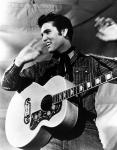




 Buy Now
Buy Now






